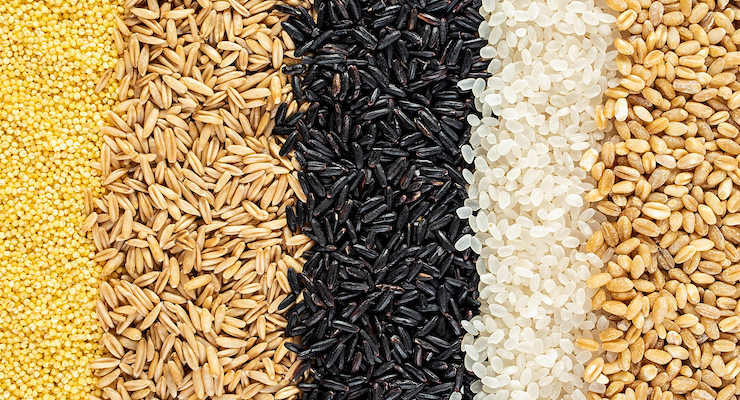Mike Montemarano, Associate Editor 04.19.21
The debate over carbohydrates is a contentious one, and while many experts consider refined grains (grains which have had impurities, including nutrients and fiber, removed, such as white bread, flour, etc.) to be something one should avoid at all costs, a recent panel of experts suggest that refined “staple” grains are important to a healthy diet.
Currently, refined grains are still the main source of dietary carbohydrates in many countries, and both studies and meta-analyses have linked high refined carbs intake to an increased risk of many diseases, including obesity, heart disease, and type 2 diabetes. Several nutrition expert organizations, including the Dietary Guidelines for Americans Committee, have pointed to certain risks refined carbohydrates are linked to, suggesting that people should opt to replace them with whole grains at a greater level than they currently do.
However, a recent review of 11 individual consensus statements based on scientific data of nutrient intakes, diet quality, enrichment, fortification, and weight-related outcomes, which was published in the journal Current Developments in Nutrition, suggests that there may be some benefits in including – and risks in completely excluding – refined grains in the diet. The review, “Do Refined Grains Have a Place in a Healthy Dietary Pattern: Perspectives from an Expert Panel Consensus Meeting,” presents a case that both whole grains and refined grains (especially those which are enriched or fortified with nutrients which the American diet falls short on) can be optimal. The review was supported by the Grain Foods Foundation, a joint venture of members and suppliers in the baking and milling industries.
While refined grains are devoid of nutrient-rich bran and germ due to the milling process, they are often enriched with nutrients in order to replace these losses, and can be further fortified with several critical nutrients many Americans under-consume. The researchers specifically looked at studies published since the release of the 2015-2020 Dietary Guidelines for Americans, and concluded that “not including sufficient refined grain foods in the diet can have unintended consequences.”
“This study provides clear support to the message of the 2015-2020 DGAs and that of the recently-released 2020-2025 DGAs: whole and enriched grain foods play an essential role in a healthy diet,” study co-author Dayle Hayes, MS, RD, said. “Moreover, it reminds us of the nutrition-related health risks of eliminating or reducing grain foods from diets, at any age, and the need to better convey this message to the public.”
The authors noted, based on NHANES (National Health and Nutrition Examination Survey) data, that adults and children were most likely to have inadequate intakes of folate, iron, thiamin, magnesium, calcium, and zinc, if they removed all grains completely from their diet, but even when removing just bread, or bread and ready-to-eat cereals, less significant inadequacies still occurred.
Based on correlations between grain consumption and outcomes related to weight, disease, and nutrient inadequacies, the authors reached five general conclusions regarding refined grain consumption. They concluded that consuming a combination of whole and refined grains such as cereals, breads, rolls, and tortillas contribute to shortfall nutrients and meaningful nutrient density and adequacy to the diets of children and adults. They also found that a complete removal of either whole or refined grain foods from the diet is linked to worse nutrient inadequacies, and can result in more children and adults falling below recommended nutrient intakes. Contrary to other research, the authors concluded that observational evidence doesn’t support the notion that refined grain consumption is associated with a risk of becoming overweight or obesity. Additionally, the authors of the study believe that both research and guidance should be more nuanced when classifying grains – rather than defining grains as either “whole” or “refined,” they concluded that it would be more useful to discuss health-related outcomes that separate types of refined grains as either “staple” or “indulgent”, such as breads and cereals from cakes, cookies, etc., when assessing nutrient intake and diet quality.
The panel concluded that Americans should seek half of their grain servings from whole grains, but shouldn’t neglect the other half – three refined grain servings.
“The key takeaway of this review is that Americans need to know the many benefits of including both whole grain and refined grain foods in their diets, while also understanding what types of grain foods – what I like to call ‘indulgent grain foods’ – to limit,” Glenn Gaesser, PhD, co-author of the study, said. “Make-half-your-grains-whole dietary guidance has been based on decades of studies that focus on dietary patterns, rather than specific food groups, but the rare research that does consider different types of refined grains shows that they are far from being the ‘bad guy.’”
“Make-half-your-grains-whole messaging dominates, and is indeed essential, but it’s worrisome that enriched grain messaging seems to have been lost,” Sylvia Klinger, RDN, member of the Scientific Advisory Board of the Grain Foods Foundation, said. “Refined grain foods have been fortified to help alleviate shortfalls of nutrients including B-vitamins, thiamin, niacin, riboflavin, iron, and folic acid, which has played a huge role in preventing neural tube defects.”
“With this in mind, clearer guidance is needed to help Americans include refined grains as part of the recommended six daily servings for the most comprehensive nutritional benefit grains can offer.”
Mike Montemarano has been the Associate Editor of Nutraceuticals World since February 2020. He can be reached at mmontemarano@rodmanmedia.com.
Currently, refined grains are still the main source of dietary carbohydrates in many countries, and both studies and meta-analyses have linked high refined carbs intake to an increased risk of many diseases, including obesity, heart disease, and type 2 diabetes. Several nutrition expert organizations, including the Dietary Guidelines for Americans Committee, have pointed to certain risks refined carbohydrates are linked to, suggesting that people should opt to replace them with whole grains at a greater level than they currently do.
However, a recent review of 11 individual consensus statements based on scientific data of nutrient intakes, diet quality, enrichment, fortification, and weight-related outcomes, which was published in the journal Current Developments in Nutrition, suggests that there may be some benefits in including – and risks in completely excluding – refined grains in the diet. The review, “Do Refined Grains Have a Place in a Healthy Dietary Pattern: Perspectives from an Expert Panel Consensus Meeting,” presents a case that both whole grains and refined grains (especially those which are enriched or fortified with nutrients which the American diet falls short on) can be optimal. The review was supported by the Grain Foods Foundation, a joint venture of members and suppliers in the baking and milling industries.
While refined grains are devoid of nutrient-rich bran and germ due to the milling process, they are often enriched with nutrients in order to replace these losses, and can be further fortified with several critical nutrients many Americans under-consume. The researchers specifically looked at studies published since the release of the 2015-2020 Dietary Guidelines for Americans, and concluded that “not including sufficient refined grain foods in the diet can have unintended consequences.”
“This study provides clear support to the message of the 2015-2020 DGAs and that of the recently-released 2020-2025 DGAs: whole and enriched grain foods play an essential role in a healthy diet,” study co-author Dayle Hayes, MS, RD, said. “Moreover, it reminds us of the nutrition-related health risks of eliminating or reducing grain foods from diets, at any age, and the need to better convey this message to the public.”
The authors noted, based on NHANES (National Health and Nutrition Examination Survey) data, that adults and children were most likely to have inadequate intakes of folate, iron, thiamin, magnesium, calcium, and zinc, if they removed all grains completely from their diet, but even when removing just bread, or bread and ready-to-eat cereals, less significant inadequacies still occurred.
Based on correlations between grain consumption and outcomes related to weight, disease, and nutrient inadequacies, the authors reached five general conclusions regarding refined grain consumption. They concluded that consuming a combination of whole and refined grains such as cereals, breads, rolls, and tortillas contribute to shortfall nutrients and meaningful nutrient density and adequacy to the diets of children and adults. They also found that a complete removal of either whole or refined grain foods from the diet is linked to worse nutrient inadequacies, and can result in more children and adults falling below recommended nutrient intakes. Contrary to other research, the authors concluded that observational evidence doesn’t support the notion that refined grain consumption is associated with a risk of becoming overweight or obesity. Additionally, the authors of the study believe that both research and guidance should be more nuanced when classifying grains – rather than defining grains as either “whole” or “refined,” they concluded that it would be more useful to discuss health-related outcomes that separate types of refined grains as either “staple” or “indulgent”, such as breads and cereals from cakes, cookies, etc., when assessing nutrient intake and diet quality.
The panel concluded that Americans should seek half of their grain servings from whole grains, but shouldn’t neglect the other half – three refined grain servings.
“The key takeaway of this review is that Americans need to know the many benefits of including both whole grain and refined grain foods in their diets, while also understanding what types of grain foods – what I like to call ‘indulgent grain foods’ – to limit,” Glenn Gaesser, PhD, co-author of the study, said. “Make-half-your-grains-whole dietary guidance has been based on decades of studies that focus on dietary patterns, rather than specific food groups, but the rare research that does consider different types of refined grains shows that they are far from being the ‘bad guy.’”
“Make-half-your-grains-whole messaging dominates, and is indeed essential, but it’s worrisome that enriched grain messaging seems to have been lost,” Sylvia Klinger, RDN, member of the Scientific Advisory Board of the Grain Foods Foundation, said. “Refined grain foods have been fortified to help alleviate shortfalls of nutrients including B-vitamins, thiamin, niacin, riboflavin, iron, and folic acid, which has played a huge role in preventing neural tube defects.”
“With this in mind, clearer guidance is needed to help Americans include refined grains as part of the recommended six daily servings for the most comprehensive nutritional benefit grains can offer.”
Mike Montemarano has been the Associate Editor of Nutraceuticals World since February 2020. He can be reached at mmontemarano@rodmanmedia.com.




























